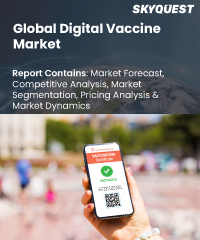
Report ID: SQMIG35G2197

Report ID:
SQMIG35G2197 |
Region:
Global |
Published Date: March, 2024
Pages:
219
|
Tables:
90 |
Figures:
76
Global Digital Vaccine Market size was valued at USD 1697.60 million in 2022 and is poised to grow from USD 1878.58 million in 2023 to USD 4224.27 million by 2031, growing at a CAGR of 10.66% during the forecast period (2024-2031).
The objective of Digital Vaccines is to modify behavioral patterns and enhance both mental and physical well-being through the utilization of neurocognitive training and nudging tactics. These innovative tools employ various digital technologies, such as virtual reality, smartphone apps, and artificial intelligence, to train the brain and promote positive habits. Digital vaccines are advanced technologies that offer the potential to improve mental health and encourage beneficial behaviors. They are affordable, user-friendly, and adaptable to diverse needs, making them capable of reaching a large audience and providing assistance where it is most required. By combining neurocognitive training and nudging strategies, digital vaccines hold significant promise for cultivating healthier behaviors and facilitating more fulfilling lives. As digital technologies continue to advance, the potential for digital vaccines to drive positive change is vast and exhilarating.
The field of digital vaccines has experienced a revolution due to the flourishing healthcare IT market and the emergence of cutting-edge concepts such as the Internet of Things (IoT), wearable technology, metaverse platforms, and augmented reality (AR/VR). These innovations enable more frequent behavioral interventions to address a wide range of diseases and phobias. For instance, the US Department of Defense's National Center for Telehealth and Technology (T2) has developed the Virtual PTSD Experience, a computer application based on the virtual world called Second Life. This virtual reality video game allows military personnel to create virtual avatars and engage in realistic scenarios that assist with mental health issues. Additionally, artificial intelligence and machine learning are increasingly utilized in digital vaccine management systems to enhance the effectiveness and precision of needle-free vaccines for treating various diseases or phobias. Furthermore, AI and machine learning can contribute to the development of video games and mobile applications that encourage young individuals to adopt healthy eating habits and active lifestyles. The first digital vaccine to be granted a US patent relies on AI-powered avatars as its foundation.
Our industry expert will work with you to provide you with customized data in a short amount of time.
REQUEST FREE CUSTOMIZATIONWant to customize this report? This report can be personalized according to your needs. Our analysts and industry experts will work directly with you to understand your requirements and provide you with customized data in a short amount of time. We offer $1000 worth of FREE customization at the time of purchase.

Report ID: SQMIG35G2197